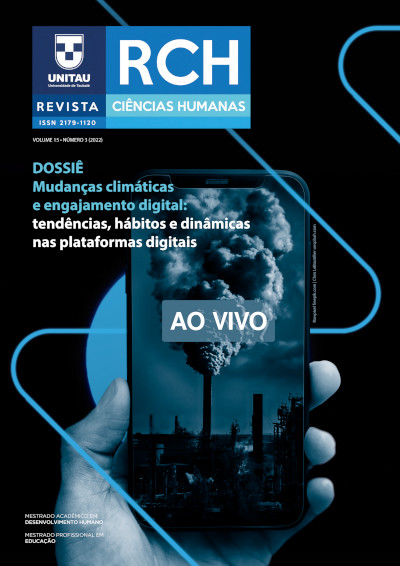THE DENIAL OF GLOBAL WARMING ON YOUTUBE
an exploratory analysis
DOI:
https://doi.org/10.32813/2179-1120.2022.v15.n3.a928Keywords:
YouTube, Negacionismo climático, Aquecimento global, Mudanças climáticas, Desinformação.Abstract
Starting from a larger context of scientific misinformation about climate change and global warming, this article seeks to analyze the presence of videos containing climate denialism within YouTube, creating an overview of how such content circulates on the platform. We used an API data collection tool to find videos on the topic starting from a search for “global warming” and collecting the search results and their related videos. We used network analysis to see what role they play in the debate on climate issues on YouTube, and who are the main influencers in the medium. We observed that there is a large amount of denialist videos, mostly with the presence of researchers and scientists from Brazilian universities, often reappropriated from TV channels and conferences, and which are often recommended by the platform’s algorithm.
Metrics
References
Allgaier, J. (2019). Science and Environmental Communication on YouTube: Strategically Distorted Communications in Online Videos on Climate Change and Climate Engineering. Frontiers in Communication, 4, 36. https://doi.org/10.3389/fcomm.2019.00036
Avaaz. (2020). Why is YouTube Broadcasting Climate Misinformation to Millions? (p. 66). Recuperado de: https://avaazimages.avaaz.org/youtube_climate_misinformation_report.pdf
Bastian, M., Heymann, S., & Jacomy, M. (2009, March). Gephi: an open source software for exploring and manipulating networks. In Proceedings of the international AAAI conference on web and social media (Vol. 3, No. 1, pp. 361-362).
Bounegru, L., Pryck, K. D., Venturini, T., & Mauri, M. (2020). “We only have 12 years”: YouTube and the IPCC report on global warming of 1.5ºC. First Monday. https://doi.org/10.5210/fm.v25i2.10112
Coagril. (2021). Seminário Energias Renováveis - com o Prof. Molion - AgroTech 2021. Recuperado em 17 de fevereiro de 2022, de https://www.youtube.com/watch?v=w-Ll0L2xVEU
Elessandro De Almeida Blogger. (2017). O Aquecimento Global é Uma MENTIRA !!!. Recuperado em 17 de fevereiro de 2022, de https://www.youtube.com/watch?v=NczsVPtY8LQ
Empoli, G. da. (2019). Os engenheiros do caos (1st ed.). Editora Vestígio.
Gillespie, T. (2014). The relevance of algorithms. In T. Gillespie, P. Boczkowski, & K. Foot (Eds.), Media Technologies: Essays on Communication, Materiality, and Society. MIT Press.
Google Ads. (2021, September 7). Updating our ads and monetization policies on climate change—Google Ads Help. Recuperado de: https://support.google.com/google-ads/answer/11221321?hl=en
Harambam, J., & Aupers, S. (2015). Contesting epistemic authority: Conspiracy theories on the boundaries of science. Public Understanding of Science, 24(4), 466–480. https://doi.org/10.1177/0963662514559891
Identidade Geral. (2015). Ricardo Felício desmente "farsa" do aquecimento global I Identidade Geral. Recuperado em 17 de fevereiro de 2022, de https://www.youtube.com/watch?v=vjpv2fftAPI
Jacomy, M., Heymann, S., Venturini, T., & Bastian, M. (2011). Forceatlas2, a continuous graph layout algorithm for handy network visualization. Medialab center of research, 560, 4.
Lewandowsky, S. (2021). Climate Change Disinformation and How to Combat It. Annual Review of Public Health, 42(1), 1–21. https://doi.org/10.1146/annurev-publhealth-090419-102409
Marres, N. (2018). Why We Can’t Have Our Facts Back. Engaging Science, Technology, and Society, 4, 423–443. https://doi.org/10.17351/ests2018.188
Olá, Ciência! (2021). 4 MENTIRAS que te contaram sobre AQUECIMENTO GLOBAL | Mudanças climáticas #2. Recuperado em 17 de fevereiro de 2022, de https://www.youtube.com/watch?v=G4XFQWExXGM
Oliveira, T. M. de. (2020). Como enfrentar a desinformação científica? Desafios sociais, políticos e jurídicos intensificados no contexto da pandemia. Liinc em Revista, 16(2), 1–23. https://doi.org/10.18617/liinc.v16i2.5374
Oreskes, N., & Conway, E. M. (2010). Merchants of doubt: How a handful of scientists obscured the truth on issues from tobacco smoke to global warming (1st ed). Bloomsbury Press.
Proctor, R. N. Agnotología. Revista de Economía Institucional, v. 22, n. 42, p. 15–48, 2020.
Rieder, B. (2015). YouTube data tools. Computer software. Vers, 1(5).
TV Brasil. (2010). 3a1 - Luiz Carlos Molion - Aquecimento Global (Parte 1). Recuperado em 17 de fevereiro de 2022, de https://www.youtube.com/watch?v=OnPdU-PY16A
TV Senado. (2019). CRE/CMA – Mudanças climáticas e aquecimento global - TV Senado ao vivo -- 28/05/2019. Recuperado em 17 de fevereiro de 2022, de https://www.youtube.com/watch?v=MP3Rp6iQq6A
Uscinski, J. E., Douglas, K., & Lewandowsky, S. (2017). Climate Change Conspiracy Theories. In J. E. Uscinski, K. Douglas, & S. Lewandowsky, Oxford Research Encyclopedia of Climate Science. Oxford University Press. https://doi.org/10.1093/acrefore/9780190228620.013.328
YouTube. (2020). Política de informações médicas incorretas relacionadas à COVID-19—Ajuda do YouTube. Recuperado de: https://support.google.com/youtube/answer/9891785?hl=pt-BR
Downloads
Published
How to Cite
Issue
Section
License
Copyright (c) 2022 Human Sciences Journal - RCH

This work is licensed under a Creative Commons Attribution 4.0 International License.
The publications of the Human Sciences Journal are registered under the Creative Commons Attribution CC-BY license.
1. The contents of the manuscripts are the exclusive responsibility of their author.
2. It is allowed the total or partial reproduction of manuscripts published in the journal, provided that the source is cited.
3. When submitting their manuscript to the Journal, the authors certify that they are of their own authorship and unpublished (not published in any digital or printed media).
4. The copyright of the articles published in the Journal are of the author, with first publication rights reserved for this journal.
5. For disclosure purposes, the Journal may replicate the works published in this journal in other media, such as social networks (Facebook, Academia.Edu, etc.).
6. The Journal is of public access, therefore, the authors who submit manuscripts agree that they are of free use.
7. In case of any illegality, fraud, or other attitude that puts in doubt the honesty of the publication, especially the practice of plagiarism, the manuscript will be automatically rejected.
8. If the manuscript has already been published, it will be immediately removed from the base of the Journal, its citation linked to the Journal will be prohibited and the cancellation of the referred publication shall be reported in the next issue of the one in which the article was published. In case of the procedure for the withdrawal of the paper the authors will be informed beforehand, being guaranteed the right to a broad defense.
9. The personal data provided by the authors will be used exclusively for the services provided by this publication and will not be made available for other purposes or to third parties.





